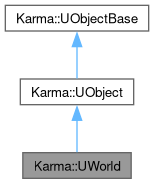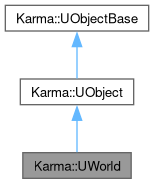#include <World.h>


Classes | |
| struct | InitializationValues |
Public Member Functions | |
| AActor * | SpawnActor (UClass *Class, FTransform const *Transform, const FActorSpawnParameters &SpawnParameters=FActorSpawnParameters()) |
| template<class T > | |
| T * | SpawnActor (UClass *Class, const FActorSpawnParameters &SpawnParameters=FActorSpawnParameters()) |
| ULevel * | GetPersistentLevel () const |
| void | SetGameInstance (UGameInstance *NewGI) |
| void | Tick (float DeltaSeconds) |
| FORCEINLINE double | GetTimeSeconds () const |
| FORCEINLINE ULevel * | GetCurrentLevel () const |
| bool | AreActorsInitialized () const |
| bool | HasBegunPlay () const |
| void | InitializeNewWorld (const InitializationValues IVS=InitializationValues(), bool bInSkipInitWorld=false) |
| void | InitializeActorsForPlay (const FURL &InURL, bool bResetTime=true) |
| void | ModifyLevel (ULevel *Level) const |
| bool | IsGameWorld () const |
| void | RemoveActor (AActor *Actor, bool bShouldModifyLevel) const |
| bool | ShivaActor (AActor *Actor, bool bNetForce=false, bool bShouldModifyLevel=true) |
| void | AddOnActorSpawnedHandler () const |
| void | RemoveOnActorSpawnedHander () const |
| void | OnActorSpawned () |
 Public Member Functions inherited from Karma::UObject Public Member Functions inherited from Karma::UObject | |
| UObject () | |
| virtual void | FinishDestroy () |
| virtual const std::string & | GetDesc () |
| Return a one line description of an object for viewing in the thumbnail view of the generic browser. | |
| virtual class UWorld * | GetWorld () const |
| Returns what UWorld this object is contained within. | |
| bool | IsValidChecked (const UObject *Test) |
| virtual void | BeginDestroy () |
| Called before destroying the object. This is called immediately upon deciding to destroy the object, to allow the object to begin an asynchronous cleanup process. | |
| FORCEINLINE bool | Modify (bool bAlwaysMarkDirty=true) |
| bool | IsSelected () const |
| Test the selection state of a UObject. | |
 Public Member Functions inherited from Karma::UObjectBase Public Member Functions inherited from Karma::UObjectBase | |
| UObjectBase (UClass *inClass, EObjectFlags inFlags, EInternalObjectFlags inInternalFlags, UObject *inOuter, const std::string &inName) | |
| UPackage * | GetPackage () const |
| UPackage * | GetExternalPackage () const |
| bool | IsUnreachable () const |
| FORCEINLINE void | SetInternalIndex (uint32_t StoreIndex) |
| FORCEINLINE uint32_t | GetInterIndex () const |
| void | MarkAsGarbage () |
| void | ClearGarbage () |
| FORCEINLINE const std::string & | GetName () const |
| FORCEINLINE void | SetObjectName (const std::string &aName) |
| FORCEINLINE UObject * | GetOuter () const |
| UObject * | GetTypedOuter (UClass *Target) const |
| template<typename T > | |
| T * | GetTypedOuter () const |
| bool | IsValidLowLevel () const |
| template<typename OtherClassType > | |
| FORCEINLINE bool | IsA (OtherClassType SomeBase) const |
| FORCEINLINE UClass * | GetClass () const |
| FORCEINLINE EObjectFlags | GetFlags () const |
| FORCEINLINE void | SetFlags (EObjectFlags NewFlags) |
| FORCEINLINE void | ClearFlags (EObjectFlags NewFlags) |
| FORCEINLINE bool | HasAnyFlags (EObjectFlags FlagsToCheck) const |
| FORCEINLINE bool | HasAnyInternalFlags (EInternalObjectFlags FlagsToCheck) const |
| FORCEINLINE void | SetInternalFlags (EInternalObjectFlags FlagsToSet) const |
| FORCEINLINE void | AddToRoot () |
Static Public Member Functions | |
| static UWorld * | CreateWorld (const EWorldType::Type InWorldType, bool bInformEngineOfWorld, const std::string &WorldName="NoName", UPackage *InWorldPackage=NULL, bool bAddToRoot=true, bool bInSkipInitWorld=false) |
 Static Public Member Functions inherited from Karma::UObject Static Public Member Functions inherited from Karma::UObject | |
| static const char * | StaticConfigName () |
 Static Public Member Functions inherited from Karma::UObjectBase Static Public Member Functions inherited from Karma::UObjectBase | |
| static FORCEINLINE EInternalObjectFlags | FixGarbageOrPendingKillInternalObjectFlags (const EInternalObjectFlags InFlags) |
Public Attributes | |
| uint8_t | m_bIsTearingDown: 1 |
| uint8_t | m_bActorsInitialized: 1 |
| uint8_t | m_bBegunPlay: 1 |
| EWorldType::Type | m_WorldType |
Additional Inherited Members | |
 Protected Member Functions inherited from Karma::UObjectBase Protected Member Functions inherited from Karma::UObjectBase | |
| FORCEINLINE void | SetFlagsTo (EObjectFlags NewFlags) |
Detailed Description
The World is the top level object representing a map or a sandbox in which Actors and Components will exist and be rendered.
A World can be a single Persistent Level with an optional list of streaming levels that are loaded and unloaded via volumes and blueprint functions or it can be a collection of levels organized with a World Composition.
In a standalone game, generally only a single World exists except during seamless area transitions when both a destination and current world exists. In the editor many Worlds exist: The level being edited, each PIE instance, each editor tool which has an interactive rendered viewport, and many more.
Member Function Documentation
◆ AddOnActorSpawnedHandler()
| void Karma::UWorld::AddOnActorSpawnedHandler | ( | ) | const |
Add a listener for OnActorSpawned events
Not functional
◆ AreActorsInitialized()
| bool Karma::UWorld::AreActorsInitialized | ( | ) | const |
Returns true if the actors have been initialized and are ready to start play
◆ CreateWorld()
|
static |
Static function that creates a new UWorld and returns a pointer to it
◆ HasBegunPlay()
| bool Karma::UWorld::HasBegunPlay | ( | ) | const |
Initializes a newly created world. This and nearby functions (create destroy world for instance) should be useful Returns true if gameplay has already started, false otherwise.
◆ InitializeActorsForPlay()
| void Karma::UWorld::InitializeActorsForPlay | ( | const FURL & | InURL, |
| bool | bResetTime = true ) |
Initializes all actors and prepares them to start gameplay
- Parameters
-
InURL commandline URL bResetTime (optional) whether the WorldSettings's TimeSeconds should be reset to zero
◆ InitializeNewWorld()
| void Karma::UWorld::InitializeNewWorld | ( | const InitializationValues | IVS = InitializationValues(), |
| bool | bInSkipInitWorld = false ) |
Initializes a newly created world.
◆ IsGameWorld()
| bool Karma::UWorld::IsGameWorld | ( | ) | const |
Returns true if this world is any kind of game world (including PIE worlds)
◆ ModifyLevel()
| void Karma::UWorld::ModifyLevel | ( | ULevel * | Level | ) | const |
Transacts the specified level – the correct way to modify a level as opposed to calling Level->Modify.
◆ OnActorSpawned()
| void Karma::UWorld::OnActorSpawned | ( | ) |
Broadcasts a notification whenever an actor is spawned. This event is only for newly created actors.
We may take digression from ue in the sense that we may use Karma's own event broadcasting system Not functional
◆ RemoveActor()
| void Karma::UWorld::RemoveActor | ( | AActor * | Actor, |
| bool | bShouldModifyLevel ) const |
Removes the passed in actor from the actor lists. Please note that the code actually doesn't physically remove the index but rather clears it so other indices are still valid and the actors array size doesn't change.
- Parameters
-
Actor Actor to remove. bShouldModifyLevel If true, Modify() the level before removing the actor if in the editor.
◆ SetGameInstance()
|
inline |
Sets the owning game instance for this world
◆ ShivaActor()
| bool Karma::UWorld::ShivaActor | ( | AActor * | Actor, |
| bool | bNetForce = false, | ||
| bool | bShouldModifyLevel = true ) |
Removes the actor from its level's actor list and generally cleans up the engine's internal state. What this function does not do, but is handled via garbage collection instead, is remove references to this actor from all other actors, and kill the actor's resources. This function is set up so that no problems occur even if the actor is being destroyed inside its recursion stack.
In UE this routine is called DestoryActor, in Karma, obviously, we be using ShivaActor which should mean the same.
- Parameters
-
ThisActor Actor to remove. bNetForce [optional] Ignored unless called during play. Default is false. bShouldModifyLevel [optional] If true, Modify() the level before removing the actor. Default is true.
- Returns
- true if destroyed or already marked for destruction, false if actor couldn't be destroyed.
- See also
- Actor::DispatchBeginPlay(bool bFromLevelStreaming)
◆ SpawnActor() [1/2]
|
inline |
Templated version of SpawnActor that allows you to specify the class type via parameter while the return type is a parent class of that type
◆ SpawnActor() [2/2]
| AActor * Karma::UWorld::SpawnActor | ( | UClass * | Class, |
| FTransform const * | Transform, | ||
| const FActorSpawnParameters & | SpawnParameters = FActorSpawnParameters() ) |
Spawn Actors with given transform and SpawnParameters
- Parameters
-
Class Karma's, UE based, meta info Class to Spawn Transform World Transform to spawn with SpawnParameters Spawn Parameters specific to the Actor
- Returns
- Actor that just spawned
◆ Tick()
| void Karma::UWorld::Tick | ( | float | DeltaSeconds | ) |
Update the level after a variable amount of time, DeltaSeconds, has passed. All child actors are ticked after their owners have been ticked.
Member Data Documentation
◆ m_bActorsInitialized
| uint8_t Karma::UWorld::m_bActorsInitialized |
Time in seconds since level began play, but IS paused when the game is paused, and IS dilated/clamped. Whether actors have been initialized for play
◆ m_bBegunPlay
| uint8_t Karma::UWorld::m_bBegunPlay |
Whether BeginPlay has been called on actors
◆ m_bIsTearingDown
| uint8_t Karma::UWorld::m_bIsTearingDown |
Is the world being torn down
◆ m_WorldType
| EWorldType::Type Karma::UWorld::m_WorldType |
The type of world this is. Describes the context in which it is being used (Editor, Game, Preview etc.)
The documentation for this class was generated from the following files:
- Karma/src/Karma/GameFramework/World.h
- Karma/src/Karma/GameFramework/World.cpp
Generated by